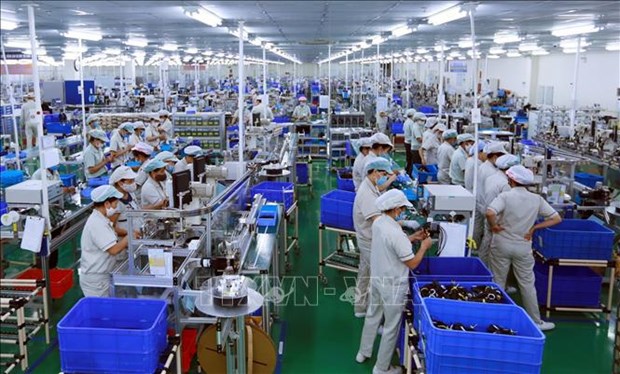International integration drives Vietnam’s economic growth
Over 17 years of being a member of the World Trade Organisation (WTO), Vietnam has seen hallmark economic growth thanks to economic integration into the world, providing strong momentum for further development.
Emerging as one of 20 largest trading economies
During her visit to Vietnam in May 2023, WTO Director-General Ngozi Okonjo-Iweala praised Vietnam’s impressive economic growth and trade amid the global headwinds prevalent in the world economy.
 While many major economies recorded contraction last year, Vietnam posted a GDP growth rate of 5.05%
While many major economies recorded contraction last year, Vietnam posted a GDP growth rate of 5.05%
She described Vietnam as a bright example of economic growth based on the achievements of international economic integration, which have fostered trade, investment, as well as the country’s successful participation in globalisation and in the re-shaping of regional and international supply chains.
Vietnam joined the WTO on January 11, 2007, and has evolved into one of the 20 largest trading economies. Its export value shot up almost eight-fold compared to that in the time of its official entry into the WTO, from 48 billion USD in 2007 to 371.85 billion USD in 2022. The disbursed foreign direct investment (FDI) stood at about 23.18 billion USD in 2023. While many major economies recorded contraction last year, Vietnam was a bright spot with a GDP growth rate of 5.05%.
Vietnam’s international trade rocketed 6.6-fold since entering the WTO, according to the Ministry of Industry and Trade (MoIT).
The country has established itself as a manufacturing base of many multinationals, including hi-tech companies, and is gradually moving up on regional and global production chains.
In 2023, the Vietnamese economy was valued at 430 billion USD while per capita income increased 160 USD from the previous year to 4,284 USD. The highest GDP growth was recorded in 2022, at over 8%.
MoIT Minister Nguyen Hong Dien said international markets and trade relations continue to be expanded. The recent conclusion of talks on a free trade agreement (FTA) with Israel and the signing of the minutes on the conditional conclusion of negotiations on a comprehensive economic partnership agreement with the UAE have opened the door wide for Vietnamese goods to enter the Middle East, which has combined GDP of about 2 trillion USD.
Based on the principles of the WTO, Vietnam has signed and implemented 16 FTAs with over 60 partners, which account for nearly 90% of the global GDP. Most of these signings are with large economies.
Improving effectiveness of international economic integration
Economic expert Dr. Nguyen Minh Phong said international integration and a higher level of economic liberalism, including economic policy reforms within the frameworks of the WTO and FTAs, have provided a strong impetus for Vietnam to develop and become a competitive and modern country.
However, the increasing integration into the world’s economy has also posed challenges to the Vietnamese economy.
Le Viet Nga, Deputy Director of the MoIT’s Domestic Market Department, noted that thanks to lower tariffs, foreign goods have flown into the domestic market while many export sectors have to satisfy growing requirements in foreign markets.
Meanwhile, the application of trade remedies has also increased in many foreign markets, Deputy Director of the MoIT’s Trade Remedies Authority of Vietnam Chu Thang Trung pointed out. He said that 24 markets, including such major ones as the US, India, Turkey, and Canada, have launched hundreds of trade remedy lawsuits against Vietnamese exports.
Minister Dien said authorities will continue grasping developments in regional and international markets, enhance the forecast capacity to propose flexible moves in response to partners’ new policies, and align legal regulations and policies with commitments on international economic integration.
In particular, the MoIT will monitor over 170 export commodities and include 18 prone to trade remedies on the list of early warnings to help relevant ministries, sectors, localities, and businesses to respond with production and export plans to minimise adverse impact, he added.
Experts also recommended that to integrate effectively, businesses should actively learn market tastes, modernise technology, improve governance capacity, and join hands with authorities in building a self-reliant and resilient economy of Vietnam./.
VNA

